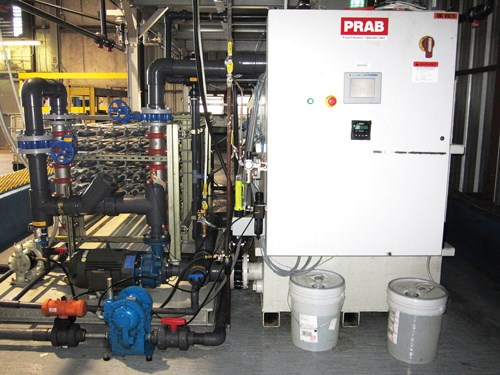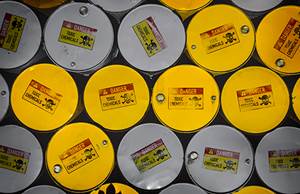Ultrafiltration Reduces Costs and Environmental Impact
Manufacturing companies are always looking for ways to streamline production and reduce material usage on the front end. It is also important that they consider effective methods for handling metal and fluid byproducts.
No business has room for costly waste. Manufacturing companies are always looking for ways to streamline production and reduce material usage on the front end to save money. It is also important that they consider effective methods for handling metal and fluid byproducts to save money and perhaps even create a new profit center.
An industry leading manufacturer of industrial-grade fastening systems located in the Southwest United States produces durable fasteners for operation in extreme conditions. Rigorous standards within the transportation, aerospace, automotive and oil and gas industries drive the market for high quality engineered fastening systems.
Even as demand for its product continued to increase, the manufacturer took the initiative to identify operational improvements throughout its entire process. These improvements were created to pinpoint what could be done to operate more efficiently and reduce environmental impact. The most significant process point that met both of these criteria was the vast amount of water used during the annealing process.
The Challenge
The annealing process is an important manufacturing stage that subjects the metal components to very high temperatures. These temperatures structurally change the metal, causing it to harden. Once the heating part of the process occurs, the metal parts must be properly cooled, typically using city water.
In addition to the annealing process, the parts are placed in large washing machines to clean off any remaining machining oils. This stage also requires a great deal of water. The manufacturer ran five of these washing machines, with each wash cycle pulling fresh water from city lines. On average, the parts washers consumed 1,000 gallons of water during a 5-hour shift. During peak loads, water consumption could easily be more than double this amount.
Leading the team that identified this process improvement opportunity were the plant maintenance manager and the maintenance technician. Together, they developed the business case for recycling and reducing water used during the parts washing and annealing processes.
The initial challenge to recycling the water was the high concentration of entrained oil from the parts as they came from the machining centers. The historical process for dealing with this water was a centrifuge system that sucked the oily water into drums. The drums were then stored on site and periodically hauled away. The temporary storage of the drums consumed valuable plant floor space, and the manufacturer had to pay a contractor to haul away the hazardous materials.
With the ever increasing costs of city utilities and machining oils, combined with the corporate initiative to be environmental stewards, the team was able to make a solid case for exploring viable filtering and recycling options.
The Solution
During their investigation, the team reached out to PRAB engineers, tapping into the company’s 60 years of fluid filtration experience. Working as an integral partner on the project, PRAB installed a pilot ultrafiltration system in the facility for a trial evaluation. Within a short period, the system proved successful enough to warrant the pursuit of capital funding so the company could purchase a system. Once approved, the system was installed, and it paid for itself within 8 months of use.
PRAB’s line of ultrafiltration systems are designed to separate emulsified oils and suspended solids from wastewater and coolant. They reduce oily water volumes by as much as 98 percent without the use of chemical additives. System effluent water can then be safely discharged to the sewer or reused in the manufacturing process.
The complete system at this fastener manufacturer includes a magnetic separator designed for ferrous particulate removal to 20 microns, a tramp oil separator that allows for removal of free floating and mechanically dispersed oils, and ultrafiltration engineered to remove emulsified oils and particulate to a level of 0.05 micron. The cost of operating this system is only 2 cents per gallon, which is far below the combined expenses of incoming city water, sewer charges and subsequent haul away costs that the company had been paying.
The Results
Beyond the 8-month payback on the equipment purchase and installation costs, the ultrafiltration system allowed the fastener system manufacturer to reduce fresh water consumption by a projected 130,000 gallons annually, at an estimated cost of $274,303. The system saved $95,827 in the first year in hauling and disposal costs for the oily water. With increasing environmental disposal costs and the rising demand for fasteners, the company expected the savings to almost triple in the second year of operation. The system also allowed the company to add a new revenue stream for the reclaimed oil, bringing in 30 cents per gallon.
Related Content
Sita’s CleanoSpector Measures Part Cleanliness
PMTS 2023: Handheld measuring device checks for cleanliness of parts to assure product quality as well as prior to follow-up processes.
Read MoreIn-line Monitoring for Automated Immersion Cleaning Systems
Ecoclean’s Acoustic Performance Measurement (APM) system provides in-line measurement of ultrasonic frequency and power in fully automated immersion cleaning systems on a batch-by-batch basis or at defined time intervals, such as once a shift, day or week.
Read MoreMultisolvent 100 Vacuum Vapor Degreaser Provides Contactless Cleaning
PMTS 2023: With applications in the most demanding industrial sectors, the machine is especially useful for cleaning parts in the turning, precision mechanics, medical and aerospace industries.
Read MoreParts Cleaning Sector Shifts Energy Toward Regulatory Changes
With changes in EPA regulations regarding the use of some popular cleaning fluids, cleaning suppliers and end users are readjusting business strategies and/or cleaning processes to meet new requirements.
Read MoreRead Next
Integrated Solutions for Chip Removal and Fluid Filtration
Shops can easily view chips simply as waste, hardly giving a second thought to the disposal process and the potential related savings. By keeping an eye on the waste and choosing the most efficient methods of chip disposal, a shop can easily add to the bottom line through substantial savings.
Read MoreA Tooling Workshop Worth a Visit
Marubeni Citizen-Cincom’s tooling and accessory workshop offers a chance to learn more about ancillary devices that can boost machining efficiency and capability.
Read More5 Aspects of PMTS I Appreciate
The three-day edition of the 2025 Precision Machining Technology Show kicks off at the start of April. I’ll be there, and here are some reasons why.
Read More
























